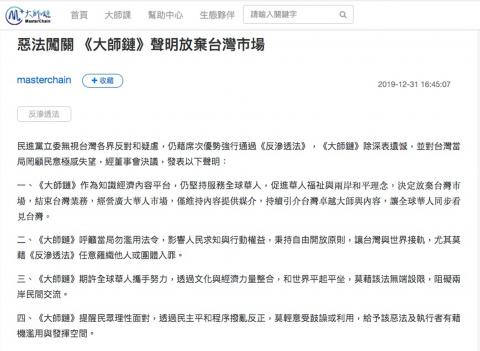The Chinese-language China Times yesterday vowed to sue a local media organization that accused it of contriving with Chinese authorities against the Anti-infiltration Act (反滲透法).
The Democratic Progressive Party (DPP), which has a majority in the Legislative Yuan, passed a third reading of the legislation on Tuesday.
The act aims to prevent meddling by external hostile forces, and ensure national security and social stability.

Screen grab from the Master Chain Web site
Pan-blue camp politicians, including People First Party Chairman James Soong (宋楚瑜), his party’s presidential candidate, have criticized the act as reinstating an autocratic system in Taiwan.
Chinese-language online news outlet Up Media reported on Tuesday that officials from China’s Taiwan Affairs Office (TAO) instructed news organizations under Want Want China Times Media Group (旺旺中時集團) to suspend their operations in protest against the law and the DPP.
Group chairman Tsai Eng-meng (蔡衍明) had agreed to suspend only the China Times, as its daily circulation is limited, Up Media reported.
However, during a meeting with Tsai on Tuesday, most management staff were reserved about such a move, so they decided not to suspend operations and continue to criticize the act while waiting to gauge the situation after the elections on Saturday next week, it reported.
Up Media’s “false report” has sabotaged the reputation of Tsai and the China Times, which today would file a lawsuit against the journalist who wrote the report, and Up Media’s president and chairman, the China Times said in a statement on its Web site.
The claim that the TAO and China Times personnel deliberated strategy against the act was sheer fabrication, it said.
The China Times is unwavering in its “connecting China” stance, while the Want Daily sticks to its belief that “Taiwan’s well-being is only possible with cross-strait rapport,” the China Times added.
As the papers cannot easily change their values, the China Times is considering how to present reports and commentaries without contravening the act, which is unclear, it said.
Meanwhile, online media start-up Master Chain (大師鏈), the first Taiwanese media organization to enter China, said it has decided to abandon the Taiwanese market.
Master Chain is deeply disappointed in Taiwanese authorities after DPP lawmakers pushed through the act, despite doubts about its content, it said in a statement on Tuesday.
Chinese worldwide should join hands to integrate their cultural and economic power, rather than obstructing cross-strait exchanges through legislation, it said.

ENDEAVOR MANTA: The ship is programmed to automatically return to its designated home port and would self-destruct if seized by another party The Endeavor Manta, Taiwan’s first military-specification uncrewed surface vehicle (USV) tailor-made to operate in the Taiwan Strait in a bid to bolster the nation’s asymmetric combat capabilities made its first appearance at Kaohsiung’s Singda Harbor yesterday. Taking inspiration from Ukraine’s navy, which is using USVs to force Russia’s Black Sea fleet to take shelter within its own ports, CSBC Taiwan (台灣國際造船) established a research and development unit on USVs last year, CSBC chairman Huang Cheng-hung (黃正弘) said. With the exception of the satellite guidance system and the outboard motors — which were purchased from foreign companies that were not affiliated with Chinese-funded

PERMIT REVOKED: The influencer at a news conference said the National Immigration Agency was infringing on human rights and persecuting Chinese spouses Chinese influencer “Yaya in Taiwan” (亞亞在台灣) yesterday evening voluntarily left Taiwan, despite saying yesterday morning that she had “no intention” of leaving after her residence permit was revoked over her comments on Taiwan being “unified” with China by military force. The Ministry of the Interior yesterday had said that it could forcibly deport the influencer at midnight, but was considering taking a more flexible approach and beginning procedures this morning. The influencer, whose given name is Liu Zhenya (劉振亞), departed on a 8:45pm flight from Taipei International Airport (Songshan airport) to Fuzhou, China. Liu held a news conference at the airport at 7pm,

Authorities yesterday elaborated on the rules governing Employment Gold Cards after a US cardholder was barred from entering Taiwan for six years after working without a permit during a 2023 visit. American YouTuber LeLe Farley was barred after already being approved for an Employment Gold Card, he said in a video published on his channel on Saturday. Farley, who has more than 420,000 subscribers on his YouTube channel, was approved for his Gold Card last month, but was told at a check-in counter at the Los Angeles International Airport that he could not enter Taiwan. That was because he previously participated in two

SECURITY RISK: If there is a conflict between China and Taiwan, ‘there would likely be significant consequences to global economic and security interests,’ it said China remains the top military and cyber threat to the US and continues to make progress on capabilities to seize Taiwan, a report by US intelligence agencies said on Tuesday. The report provides an overview of the “collective insights” of top US intelligence agencies about the security threats to the US posed by foreign nations and criminal organizations. In its Annual Threat Assessment, the agencies divided threats facing the US into two broad categories, “nonstate transnational criminals and terrorists” and “major state actors,” with China, Russia, Iran and North Korea named. Of those countries, “China presents the most comprehensive and robust military threat